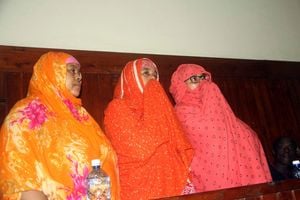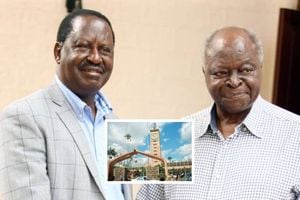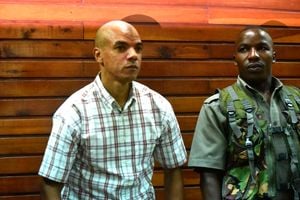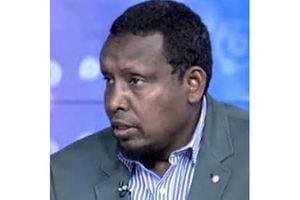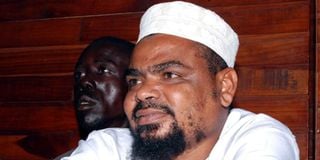
Islamic preacher Aboud Rogo Mohammed before a Mombasa court where he was charged with being in procession of illegal firearms before he was killed in 2012.
More than a decade after the death of controversial Muslim cleric Aboud Rogo, the echoes of his extremist ideology are still being heard beyond the confines of his grave.
It appears that when he was gunned down on August 27, 2012 by unknown assailants believed to be State operatives, the government neglected to erase his traces such as video clips containing his radical preaching on social media as part of the de-radicalisation.
The State had accused Rogo of branwashing youth before recruiting them for the Somali-based al-Shabaab militants.
Failure to delete Rogo’s footprints has come back to haunt the government as it has emerged that his extremist teachings are still being downloaded from the internet and used to radicalise and recruit for al Shabaab in Somalia and ISIS in the Democratic Republic of Congo.
Documents presented in court by the Anti-Terror Police Unit (ATPU) officers reveal that reverberations of Rogo’s radical beliefs continue to be felt outside the confines of his tomb, as ISIS and Al Shabaab sympathisers, are utilising these preaching’s to enlist Kenyan youth from the Coast to join the militants.
Also Read: The tough lives of Jihadi brides
These videos are now available on popular social media site Tiktok, where investigations have revealed that the terror outfits sympathisers download them to carry out radicalisation and recruitment.
On April 9 and 10, ATPU officers in Mombasa arrested two men in Likoni after it emerged that a terror cell was being actively used in the area to recruit for the two terror outfits.
Hussein Yusuf Mrafi ,27, and Ali Mwalimu Mwinyi ,21, are currently helping the detectives to establish the number of youth who have been recruited to the terror groups using the preaching’s from the Rogo videos available on the social media.
Police Constable Joseph Mwai presented these suspects before Mombasa Senior Resident Magistrate David Odhiambo to ask for custodial orders to enable him investigate the matter deeper.
According to the officer, the duo is suspected to have committed the offence of recruiting members for al Shabaab and ISIS.
“Preliminary investigations have indicated that Mr Mrafi is a recruiter of terrorist groups ISIS in the DRC, and al- Shabaab in Somalia. Mr Mwinyi had been recruited into joining al-Shabaab,” he told the court
Further , the detective said that the intelligence in their possession indicates that Mrafi and Mwinyi knew a man only identified as Nassoro who was their close friend in Likoni.
These three friends , the court heard would listen and spread Rogo’s radical teachings in the entire Likoni area.
“The respondents have acknowledged that they listen to Rogo’s teachings on Jihad. They also have two mutual friends that have gone to join al- Shabaab after listening to the radical teachings,” said the officer.
The officer said investigations have revealed that the said Nassoro embraced the idea of people calling him Rogo started accessing the videos of Rogo’s preaching from the social media site TikTok and spreading the same.
To further explain the need to have these two suspects detained pending further investigations , the officer told the court that preliminary interviews with the two have revealed that the respondents are aware that Nassoro has gone to join al-Shabaab in Somalia.
The court heard that Mrafi has informed the detectives that there are others who are still using Rogo’s teachings to radicalise and who are still at large.
“The two respondents may be part of a terror cell brewing in Likoni. We are yet to record statements from the key witnesses and subject the respondents cell phone to forensic analysis,” said Mr Mwai.
The investigators are now seeking to exploit their mobile phones to determine the extent to which these videos have been used to facilitate radicalisation and the recruitment drive.
These gadgets including hard drive disks seized during the arrest will be forwarded to the ATPU’s Cyber Forensic Laboratory for forensic analysis.
“Time that has lapsed since the arrest of the respondents is not sufficient to make any determination thereby necessitating an application for time to complete the investigations before arriving at a decision on whether or not to charge the respondents,” said Mr Mwai.
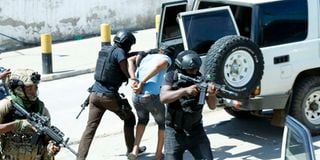
Police arrest two terror suspects at the Likoni crossing channel in Mombasa on August 23, 2021.
The detective said they needed 30 days to finalise this investigations.
However, Mr Odhiambo ruled that 21 days are sufficient.
“The police are hereby granted 21 days to finalise investigations. The respondents to be detained at ATPU Mombasa station for 21 days. This matter will be mentioned on May 7,” said the magistrate.
The police’s revelation indicates that Rogo’s preaching still poses a threat to the war against terrorism.
Mombasa advocate Mathew Nyabena says this threat exists since online digital platform is difficult to police and control.
He, however, appreciates that the government has tried to counter terrorism but believes that more can be done to remove offensive contents from the social media sites.
“Controlling the same will require cooperation of the digital platform owners. They can flag and pull down any offensive content. However, due to the fluid nature the teachings will still be available online,” he says.
Mr Nyabena says the government should also shift its focus on educating and empowering youths to avoid falling into the lure of radicalisation.
“The government has possibly tried many approaches. However, social media mutates every day. In addition the terrorists run their own sites where the offensive content is readily available,” added the advocate.
Rogo, facing charges of illegal possession of weapons and recruiting for the Somali Islamist group al-Shabaab, was fatally shot in his car while driving along the Mombasa-Malindi road.
The extremist preacher was gunned down when an unmarked vehicle overtook his car, which had six passengers, including his wife, Haniya Rogo.
Two assailants opened fire at close range, resulting in Rogo being shot in the head and dying at the scene.
After his assassination, his followers, mainly youth, instigated riots in Majengo and Kisauni, leading to property damage and injuries as cars were set on fire and other assets were destroyed.
His killing also sparked chaos at the Masjid Musa mosque in Majengo, where the preacher conducted most of his teachings, resulting in the arrest of numerous youth and frequent police raids on the mosque.
This series of raids reportedly prompted many young people to flee the Kenyan coast to various locations, such as Somalia. Some were said to have crossed into Tanzania and established a presence in Kibiti in 2015, while others managed to sneak into Mozambique through Tanzania.
In his preaching, Sheikh Rogo would often say: “I know they will kill me, but they will not be able to eliminate all of us here. Da’awa will persist even after Sheikh Rogo’s death.”
And as promised, 12 years after his assassination, hundreds of young people he allegedly recruited have reportedly joined extremist groups worldwide.
These extremists are suspected to be responsible for terrorist attacks in Mozambique, where authorities have indicated that the perpetrators now operate under the name of Ansar Al Sunnah.
This terrorist organisation was reportedly responsible for seizing the port of Mocimboa da Praia in Cabo Delgado, Mozambique in 2020.
The assault took place at a crucial location for gas companies operating in the resource-rich area.
It has been claimed that Ansar al-Sunna, also known locally as al-Shabaab, has been involved in nearly 70 per cent of all violent incidents in Mozambique since 2018, escalating their activities with each passing quarter.

